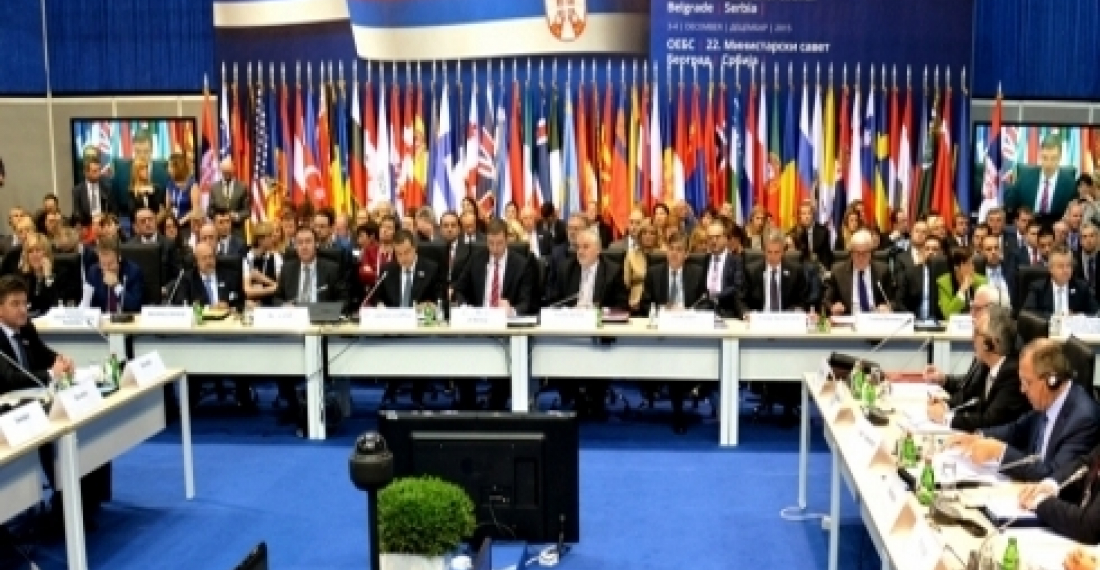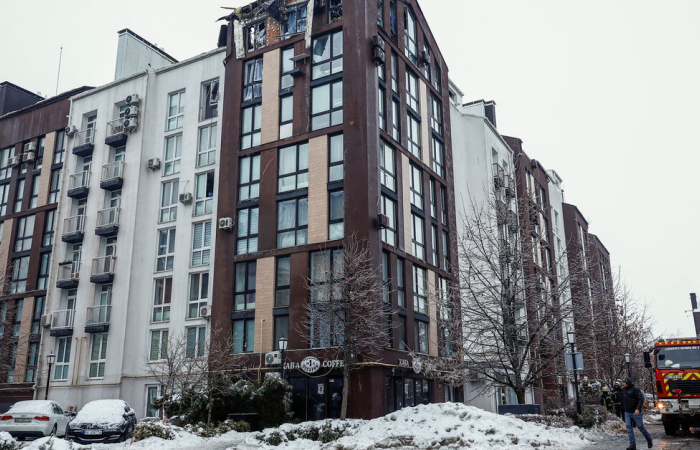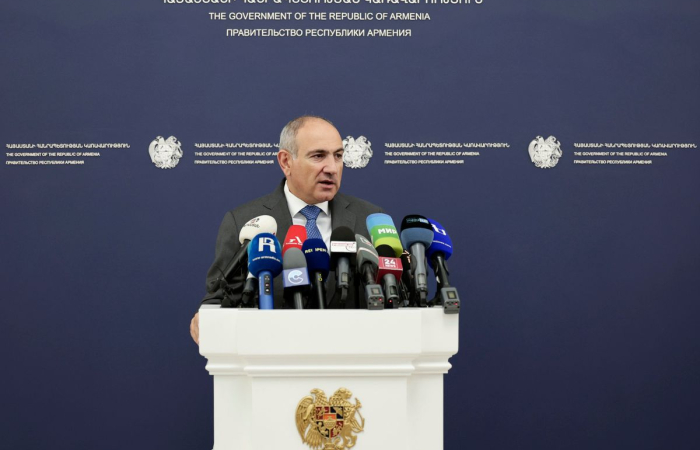France, Russia and the United States - the three co-Chair countries of the OSCE Minsk Process have rejected claims that they are to blame for setbacks in the negotiations on Nagorno-Karabakh. They said that "any attempts to blame the Co-Chairs for setbacks in the negotiation process only mask the primary obstacle to peace - the lack of political will in Armenia and Azerbaijan to reach a negotiated settlement".
In a statement issued on the margins of the Ministerial meeting of the OSCE which is currently being held in the Serbain Capital, Belgrade, Foreign Minister of the Russian Federation Sergey Lavrov, Secretary of State of the United States John Kerry, and State Secretary for European Affairs of France Harlem Desir said that they remain united in their commitment to mediating a peaceful settlement of the conflict.
The statement added, "We welcome the upcoming meeting between President of Azerbaijan Ilham Aliyev and President of Armenia Serzh Sargsyan under the auspices of the Minsk Group Co-Chairs. In light of the recent rise in tensions, we appeal to the sides to re-commit themselves to the peaceful resolution of the conflict and dispel any misperceptions that they are not serious about reaching a negotiated settlement. The sides should continue discussions from the Sochi, Wales, and Paris Summits of 2014 on elements of a comprehensive settlement, and should intensify their dialogue in 2016 on the basis of proposals currently under discussion.
With the significant escalation in violence along the Line of Contact and Armenia-Azerbaijan border this year, the status quo has become unsustainable. We especially condemn the use of mortars and other heavy weaponry, and regret deeply the civilian casualties these weapons have caused. There is no military solution to the Nagorno-Karabakh conflict, and there is no justification for the death and injury of innocent civilians. We appeal to the sides in the strongest possible terms to reduce tensions and protect lives. The Co-Chairs have proposed risk-reduction measures that we encourage the sides to adopt, including an OSCE investigation mechanism.
We welcome the progress made by the sides in implementing the data exchange on missing persons under the auspices of the International Committee of the Red Cross (ICRC). We encourage further cooperation with ICRC and must ensure that it has sufficient funding to fully implement this important humanitarian measure. Azerbaijani authorities’ decision to return an Armenian soldier who crossed the Line of Contact and an Armenian civilian who crossed the international border was a helpful humanitarian gesture and consistent with international humanitarian obligations. We urge the sides to return all remaining prisoners in the spirit of the Astrakhan Declaration of October 2010 issued by the Presidents of Armenia, Azerbaijan, and the Russian Federation. There must also be dialogue between Armenians and Azerbaijanis to build trust between neighboring peoples. We encourage the sides to work with the Co-Chairs to support programs that bring together people affected by the conflict.
Over the past year, we have witnessed increasingly vocal attacks on the Co-Chairs and the Minsk Group format. We emphasize that the Minsk Group remains the only accepted format by the sides and has the full confidence of all OSCE participating States. Any attempts to blame the Co-Chairs for setbacks in the negotiation process only mask the primary obstacle to peace - the lack of political will in Armenia and Azerbaijan to reach a negotiated settlement. The Co-Chairs will continue to brief international and regional organizations interested in supporting the Minsk Group process. We reaffirm our readiness to work closely with the sides on achieving our common objective of an enduring peace."
The Ministerial Meeting in Belgrade was also addressed by the Foreign Ministers of Armenia and Azerbaijan.
Referring to the Nagorno-Karabakh conflict, Armenian Foreign Minister Edward Nalbandian said,
"Unfortunately, peace continues to be challenged by those who refuse to abide by the common norms and principles. It has been more than two decades now that Azerbaijan rejects to recognize the right of the people of Nagorno-Karabakh to self-determination. It turns a blind eye that this very right is proclaimed by the presidents of the Co-chair countries of the OSCE Minsk Group as one of the basic principles of the Nagorno-Karabakh conflict resolution. Azerbaijan fails to notice that the determination of the final legal status of Nagorno-Karabakh through a legally binding expression of will stands at the core of the settlement proposed by the Co-chairs.
The blatant defiance to the proposals of the Co-chairs is not the only path through which Baku tries to undermine the peace process. It boasts about solving the conflict through the military buildup pumped by oil revenues and continues provocations on the line of contact with Nagorno-Karabakh and the borders with Armenia. The cease-fire violations by Baku have reached alarming levels. Baku uses heavy weaponry and deliberately targets civilians, which resulted in high numbers of casualties. Azerbaijan has an illusion that it can gain by negotiating with guns.
It does not come as a surprise that the Co-chairs directly called upon Azerbaijan to observe its commitments to the peaceful resolution of the conflict and to agree to the proposal on the creation of the mechanism of investigation of incidents, which Armenia and Nagorno-Karabakh have long accepted. The Co-chairs have also stated that Baku’s attempts to change the format or create parallel mechanisms can disrupt the negotiation process and impede progress towards a settlement. They called Azerbaijan to respect their mandate and the duties of the OSCE monitors.
Unlike Azerbaijan, Armenia has never criticized the Co-chairs. Attempts of Azerbaijan to blame the Co-chairs for setbacks in the negotiation process only mask the primary obstacle to peace – the lack of political will in Azerbaijan to reach a negotiated settlement.
The conflict resolution requires necessary political will which is manifested through unconditional adherence to the peace process, full implementation of the commitments, and readiness to build up trust. We have been witnessing time and again throughout the whole negotiation process the consistent efforts of Azerbaijan to disrespect prior agreements. Baku’s refusal to accept proposals that are the product of the tireless efforts of about twenty summits, several dozen ministerial-level meetings, and innumerable visits of the three Co-Chairs to the region has inflicted a serious blow to the negotiation process and severely damaged the trust. Therefore, curbing Azerbaijan’s destructive behavior at the negotiation table is key to the success of the peace process.
Armenia, unlike Azerbaijan, has stated many times that it is ready to continue negotiations, based on the proposals of the presidents of the Co-chair countries. As for Azerbaijan, it tries to present its distorted approaches as a position of the Co-Chairs, misinterpreting the ideas presented by foreign ministers, the statements adopted by the presidents of the Co-chair countries and even the UN Security Council resolutions. However, a mere glance reveals that the approaches of Azerbaijan contradict to the principles and elements of the five well-known statements of the heads of the Co-chair countries.Needless to say that successful peaceful settlement requires cessation of hostilities on the ground, creation of the conditions conducive for negotiations, through full respect to the 1994 trilateral cease-fire agreement and the 1995 agreement on the consolidation of the cease-fire regime. These documents, which do not have time limitations, are agreed and signed by Nagorno-Karabakh, Azerbaijan and Armenia and are prerequisites of the peace efforts.
The OSCE can contribute to the peace process by reaffirming its support to the cease-fire agreements encouraging the implementation of the confidence and security building measures, reinforcing the office of the Personal Representative of the OSCE Chairman-in-Office on Nagorno-Karabakh as the only permanent presence on the ground in the conflict zone, through increasing the number of monitors, allocating more resources and technical means.
Azerbaijan tries to invoke the Nagorno-Karabakh conflict in an effort to justify the noncompliance to the OSCE commitments. Likewise, Baku attempts to divert the attention from the outrageous human rights situation in Azerbaijan and the growing international criticism in this regard by escalating the military situation in the conflict zone. We are confident that the international reaction to Baku’s policy of escalation of tensions should not be less targeted and strict as it is on the human rights situation in Azerbaijan.
Baku’s consistent policy of reducing OSCE presence in the region is another worrying trend that cannot be disregarded. Having first downgraded and then closed the OSCE Office in Baku, imposing restrictions on ODIHR election monitoring mission, now Azerbaijan is trying to curtail activities of the Personal Representative as well. Apparently, Azerbaijan would prefer to continue its destructive policy without international witnesses. This applies also to the ICRC – the work of which Baku is continuously impeding and using for the purposes of propaganda. Armenia and Nagorno-Karabakh have closely cooperated with the Red Cross to address humanitarian issues, particularly that of missing persons. We value this cooperation which should be always based on status neutral approach and impartiality."
In his statement to the meeting the Azerbaijani Foreign Minister Elmar Mammadyarov also referred to the conflict. He said,
"The protracted conflicts in the OSCE area remain the major threat and challenge to peace and security on the European continent. I regret to inform the Ministerial Council that no substantive progress has been achieved in the settlement of the Armenia-Azerbaijan conflict since the last Ministerial Council meeting in Basel. Armenia continues to disregard the calls of the international community, including the Presidents of the OSCE Minsk Group co-chair countries to start result-oriented negotiations on a peace agreement. The leadership of Armenia imitates the engagement with a view to consolidating the volatile status-quo created through the unlawful use of force and ethnic cleansing.
So-called “balanced” or undifferentiated attitude to the aggressor and the victim will never produce a desired outcome. The policy of appeasement only emboldens the aggressor. As an example, I need to mention the ongoing efforts by Armenia towards consolidating the occupation of the territories of Azerbaijan through implantation of settlers, infrastructure changes, as well as exploitation of and illicit trade in assets, natural resources and other forms of wealth in the occupied territories, in clear violation of international humanitarian and human rights law. In this context, it is critical that the OSCE participating States demonstrate a principled position in defending the principles and values that this Organization is striving for in order to keep the prospects of political settlement alive.
The unlawful presence of the armed forces of Armenia in the occupied territories of Azerbaijan is the major destabilizing factor with the potential to escalate at any time with unpredictable consequences. The settlement of the conflict must, therefore, start with immediate, complete and unconditional withdrawal of Armenian forces from Azerbaijani territories, as demanded by the UN Security Council resolutions 822 (1993), 853 (1993), 874 (1993) and 884 (1993) and as implied by the mandate of the co-Chairmen of the OSCE Minsk Group.
Putting an end to Armenian aggression against Azerbaijan and withdrawal of Armenia’s troops will be a significant confidence building measure completely changing the dynamics of peace process and opening up immense opportunities for the development of South Caucasus. This would pave the way for a safe and dignified return of the forcibly displaced population to their places of origin, normalization of relations and restoration of the communications in the region, as well as for the creation of objective conditions for the Azerbaijani and Armenian communities of the occupied Nagorno-Karabakh region to discuss their joint future within Azerbaijan.
In this regard, latest ideas proposed by Mr. Sergey Lavrov, Minister of Foreign Affairs of the Russian Federation, supported by other OSCE Minsk Group Co-Chairs can provide a very good impetus to reach a breakthrough in peace talks."
source; commonspace.eu with the press services of the Ministries of Foreign Affairs of Armenia and Azerbaijan, and of the OSCE.
photo: The 22nd Ministerial Council of the OSCE in session in Belgrade on 3 December 2015 (picture courtesy of the OSCE).







